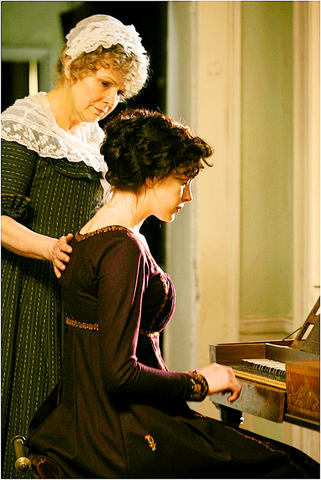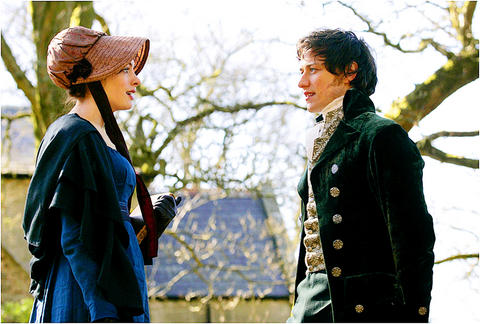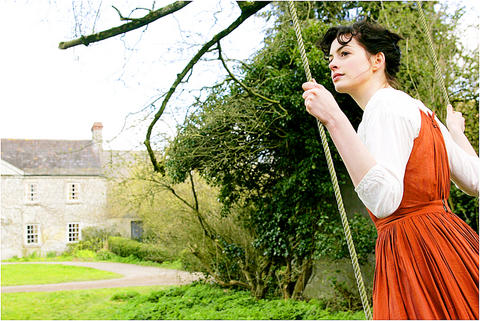How do you explain the Jane Austen bandwagon, which rolls on full steam with Becoming Jane, an imitation screen adaptation of an Austen-like novel that imagines the author's romantic life at 20? Austen's refined language, which Sarah Williams and Kevin Hood's screenplay does a reasonably good job of capturing, is part of the charm. In the age of "whatever," who doesn't relish receiving a scrupulously considered, grammatically correct answer to a question?
Austen's reassuring brand of sense and sensibility, grounded in wit and sound moral judgment, is another attraction. To literate Anglophiles, Austen and everything she represents looms as a symbolic bulwark against the values of today's babelicious Babylon. The premarital meat market of her era was reassuringly prim.
"Tainted by suspicion" is the nastiest description applied by one woman to another in this film, which plays as a fanciful, scenic (but not too opulent) prequel to Pride and Prejudice. That slur is directed at Jane by the wealthy and snobbish Lady Gresham (Maggie Smith), whose beloved nephew Mr Wisley (Laurence Fox) is dissuaded from marrying Jane after she considers, then reconsiders, eloping with her true love.

PHOTOS: COURTESY OF TA LAI
Like a modern chick-lit heroine, Jane has no interest in marrying a juiceless man, rich or poor, who has the imagination and charisma of a stick. An aspiring novelist in a rigid social order in which women of conspicuous intelligence are frowned upon, she is willing to take her chances. At its most hardheaded, the film makes clear that when Jane forfeits her best opportunity for a financially advantageous match it is no laughing matter.
These imagined Austens live in genteel poverty. Jane's father (James Cromwell) is a parish preacher, and the family's hopes for a comfortable future depend on its daughters landing rich husbands. As Jane's fussbudget mother (Julie Walters) observes, "Affection is desirable; money is absolutely indispensable."
Jane, however, is determined to marry for love or not all. When Tom Lefroy (James McAvoy), a rakish young Irish lawyer-in-training, comes along, it is him or nothing. Tom gives her a copy of Henry Fielding's History of Tom Jones, a Foundling to educate her about sex.

PHOTOS: COURTESY OF TA LAI
Austen, as we know, never married. And the movie implies that Tom was the real Mr Darcy, minus his fortune; hence, no marriage. Becoming Jane, directed by Julian Jarrold, whose previous movie was the garish comedy Kinky Boots, drives home the painfully limited options facing British women of limited means in the late-18th and early-19th centuries.
At country dances and balls, grown-ups scrutinize the behavior of blushing young women on the marriage block. Fun may be had, but the festivities are fraught with anxiety and calculation.
Becoming Jane is a triumph for Anne Hathaway, who brings to the young Jane the same jittery wide-eyed intensity she displayed in The Devil Wears Prada along with a secure British accent. She and McAvoy inject a keen intelligence into the couple's verbal jousts, along with romantic chemistry.

PHOTOS: COURTESY OF TA LAI
While Jane struggles to assert some independence, Tom squirms under the iron thumb of his humorless authoritarian uncle, Judge Langlois (Ian Richardson, in his last film role), who wields the purse strings. Everything about Jane, but especially her irony, offends this grim hanging judge, who hands out death sentences with a thunderous righteousness.
Hathaway, who is almost too pretty for the role, recalls the young Judy Garland, with her panicky stare and cherry lips. McAvoy's sexy, good-bad boy, especially in profile, resembles Bob Dylan in his early troubadour mode. With his taste for booze, bare-knuckle boxing and the occasional prostitute, Tom also suggests a whippet version of the young Albert Finney in Tom Jones.
Not much is known about the actual Austen-Lefroy relationship except that they met at a ball in 1795 around the time she had begun an early novel that was later reworked as Sense and Sensibility and that she described him in a letter to her sister, Cassandra (Anna Maxwell Martin), as "a very gentlemanlike, good-looking, pleasant young man." At a ball they apparently caused tongues to wag by sharing three dances instead of the regulation two.
The real-life Lefroy eventually married a wealthy Irish woman with whom he sired seven children and became a successful lawyer. The fanciful coda to Becoming Jane imagines a reunion between the grown-up Jane and Tom, now both slightly graying.
The screenplay's pseudo-Austen tone is so consistent that its lapses into modern romance-novel fantasy threaten to derail the film. A scene suggesting oral sex between Jane's parents is one. (Ugh!) And after Jane and Tom's first kiss, when Jane coyly inquires about her osculatory technique, you may want to howl.

April 28 to May 4 During the Japanese colonial era, a city’s “first” high school typically served Japanese students, while Taiwanese attended the “second” high school. Only in Taichung was this reversed. That’s because when Taichung First High School opened its doors on May 1, 1915 to serve Taiwanese students who were previously barred from secondary education, it was the only high school in town. Former principal Hideo Azukisawa threatened to quit when the government in 1922 attempted to transfer the “first” designation to a new local high school for Japanese students, leading to this unusual situation. Prior to the Taichung First

When the South Vietnamese capital of Saigon fell to the North Vietnamese forces 50 years ago this week, it prompted a mass exodus of some 2 million people — hundreds of thousands fleeing perilously on small boats across open water to escape the communist regime. Many ultimately settled in Southern California’s Orange County in an area now known as “Little Saigon,” not far from Marine Corps Base Camp Pendleton, where the first refugees were airlifted upon reaching the US. The diaspora now also has significant populations in Virginia, Texas and Washington state, as well as in countries including France and Australia.

On April 17, Chinese Nationalist Party (KMT) Chairman Eric Chu (朱立倫) launched a bold campaign to revive and revitalize the KMT base by calling for an impromptu rally at the Taipei prosecutor’s offices to protest recent arrests of KMT recall campaigners over allegations of forgery and fraud involving signatures of dead voters. The protest had no time to apply for permits and was illegal, but that played into the sense of opposition grievance at alleged weaponization of the judiciary by the Democratic Progressive Party (DPP) to “annihilate” the opposition parties. Blamed for faltering recall campaigns and faced with a KMT chair

Article 2 of the Additional Articles of the Constitution of the Republic of China (中華民國憲法增修條文) stipulates that upon a vote of no confidence in the premier, the president can dissolve the legislature within 10 days. If the legislature is dissolved, a new legislative election must be held within 60 days, and the legislators’ terms will then be reckoned from that election. Two weeks ago Taipei Mayor Chiang Wan-an (蔣萬安) of the Chinese Nationalist Party (KMT) proposed that the legislature hold a vote of no confidence in the premier and dare the president to dissolve the legislature. The legislature is currently controlled